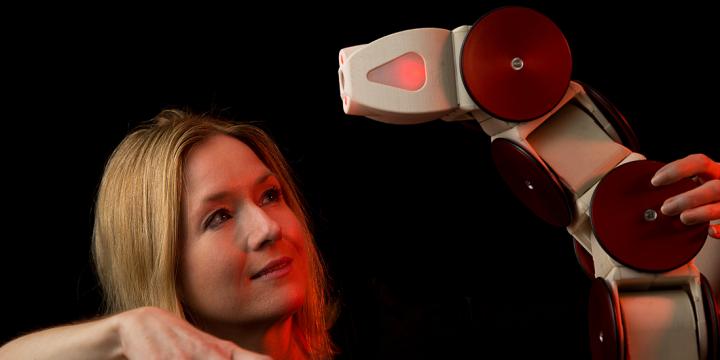Two European Research Council’s Advanced Grants will fund robot research, advanced chemistry

Credit: Kai Dragland, NTNU
Two professors from the Norwegian University of Science and Technology (NTNU) have been awarded prestigious ERC Advanced Grants by the European Research Council.
Professor Kristin Ytterstad Pettersen at the Department of Engineering Cybernetics and Professor Henrik Koch at the Department of Chemistry have each been awarded the prestigious ERC Advanced Grant.
Each grant can provide up to NOK 25 million in support over five years.
Professor Pettersen received support for her project CRÈME – Control of light vehicle-manipulator systems.
“This is amazing! I have worked very hard to develop this project. That it went through on the first try is big and a bit unexpected,” Pettersen said.
The goal is to develop mobile robots that can address many different tasks. The robots must be autonomous, meaning self-controlled, and light. The latter is important for them to be both safe for people and cheap.
These robots must be able to observe the world around them. At the same time, they must interact with the environment using one or more manipulator arms.
Among the possibilities are robots that can fly out to wind turbines far out at sea to detect problems and carry out maintenance. Another type of robot may move from its housing station on the seabed to carry out maintenance on aquaculture cages or oil installations.
The grant gives Pettersen the opportunity to hire four doctoral fellows and two postdoctoral fellows, who will work with Pettersen on the project over the next five years.
Chemist Henrik Koch is involved in the QuantumLight project at NTNU. The project focuses on advanced theoretical models for molecules.
“I’m thrilled that our hard work is being rewarded in this way,” says Professor Koch, who is also employed at Scuola Normale Superiore (SNS) in Pisa, Italy.
He praises SNS, NTNU and the Research Council of Norway for their support to date. Koch believes the project opens up great opportunities in a new field – for master’s students, doctoral students and researchers who are at an early stage in their careers.
“I would like to congratulate both recipients,” says Tor Grande, NTNU’s Pro-Rector for Research.
“Two ERC Advanced Grants for NTNU researchers in one and the same year is incredibly good news, and a great inspiration for other scientific staff who have ambitions to apply for ERC funding,” he said.
NTNU’s strategic plan says that NTNU’s research should maintain a high international level, and that the research shall be concentrated around strong academic groups that contribute to the international research front.
“It’s actually been a while since an NTNU employee received an ERC Advanced Grant. Now two very talented professors have succeeded in obtaining these prestigious grants. At NTNU, we’ve focused on achieving better success with the ERC for a long time. We’re now seeing results from this work with several awards, such as ERC Synergy, Consolidator and Starting Grants. We’ve succeeded in motivating and enabling more people to apply, and it is particularly gratifying that this is now yielding results. We’ll build on this in the years to come,” Grande said.
The European Research Council (ERC) provides grants to many researchers and research projects. ERC disburses its funding in four categories.
ERC Advanced Grants are among the most difficult to obtain and place extremely high demands on the research. Individuals apply for these grants through a host institution. At the same time, they benefit the individual, the academic group, the university and society in general.
The Research Council of Norway is also enthusiastic on behalf of NTNU and the other Norwegian recipients.
“This is super news that shows how the systematic and targeted research efforts are now bearing fruit. I would like to congratulate the great results, and I both hope and believe that NTNU will succeed at least as well in Horizon Europe,” says Mari Sundli Tveit, CEO of the Research Council of Norway.
###
Media Contact
Tor Grande
[email protected]




